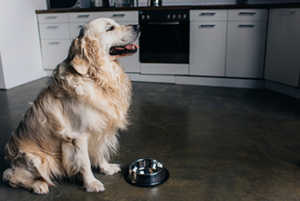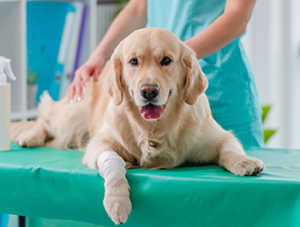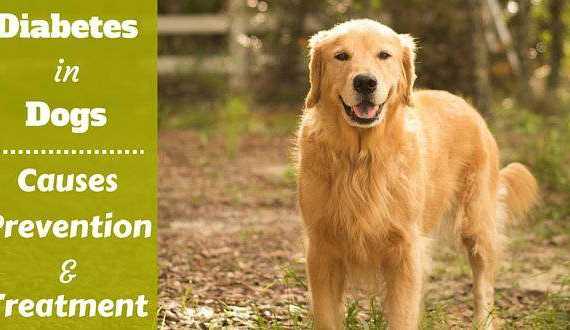Updated: August 13th, 2022

Nearly every breed of dog out there suffers diarrhea at some point, but Labrador and golden retrievers are among the most vulnerable. Fortunately, though, you can treat and even prevent it, and to help make that easier for you, I’ll let you in on all the essential information you will want to know about diarrhea in golden retrievers.
Not many pet owners know about the symptoms and causes of diarrhea in goldens, as most of them are quite subtle and easy to ignore. But if your dog suffers from this disorder at some point, you will have to first find out the root cause before attempting to treat them.
Now, if you truly care about your furry pal, this is the information you will want to have at your fingertips. I’ll keep all of it as brief and informative as possible so that you can soak it in with ease. Let’s get started!
Diarrhea In Dogs: Definition
Like with most animals, diarrhea in dogs generally takes the form of loose or unformed stools. Sometimes this could happen in large amounts and so often. The occurrence itself isn’t really an illness but rather an indication of an underlying health condition (or, in some cases, multiple conditions).
Treatment and healing time depends on the cause. If the illness causing the diarrhea is life-threatening, your dog will need advanced treatment and more time to heal. For more minor health conditions, treatment is often simple and quick–in fact, sometimes even home remedies work.
The most important thing you should do in either situation is to begin treatment early. This will save your furry pal from suffering from severe dehydration, electrolyte imbalance, and many other conditions that could worsen the situation.
What Are The Causes Of Diarrhea In Golden Retrievers?

Like I touched on earlier, both labrador and golden retrievers are uniquely prone to diarrhea. A popular culprit is their almost uncontrollable appetite. Goldies love to eat, but they aren’t careful when it comes to managing their intake.
Because of their ravenous appetite, it’s fairly common for them to eat rotten food or even non-edible stuff they manage to sniff out, especially when they’re playing and exploring outside or even just going for a short walk. Ingesting these kinds of foods and objects will usually lead to diarrhea.
Expect the same when your dog swims in still waters by the roadside or a shallow stream. Such waters are full of bacteria, and so when your dog drinks some of it, diarrhea becomes inevitable.
While this is usually the main culprit of diarrhea in golden retrievers, there are still plenty of other causes. I’ll look at them briefly below.
Causes Of Diarrhea: Food Sensitivities
Golden retrievers are one of many breeds that are especially prone to allergies. And guess what tops the list of allergens? Beef and chicken!
If your dog is allergic to one or both of these foods, you will want to avoid them if your dog seems to have recurrent diarrhea. You could also potentially bring the diet down to one protein if one food doesn’t affect your dog as much as the other. However, if the diarrhea carries on, don’t hesitate to call your vet to learn more about other ways you can adjust your dog’s diet.
Causes Of Diarrhea: Diet Changes
This is not just limited to humans; dogs too suffer stomach upsets and sudden diarrhea when you suddenly change their diet, say from a high protein to a fat-rich diet.
Avoid sudden, drastic changes to your golden’s usual meals to prevent upsetting their stomach with something they aren’t yet used to. Instead, gradually introduce new foods to their diet in small amounts.
Causes Of Diarrhea: Infections
Infections in dogs are mostly caused by viruses, with the most common ones being parvovirus, coronavirus, and distemper. Infections could also be parasitic, fungal, or bacterial. In most cases, they develop into diarrhea, alongside other unpleasant and often painful conditions. Most types of infections will need to be treated with medications prescribed by a veterinarian.
Causes Of Diarrhea: Toxins
Various foods and other substances are toxic to dogs, even in small amounts. Most have been linked with diarrhea in dogs, particularly those found in human foods and drugs. Some of the most common are:
- Chocolate,
- Onions
- Aspirin
- Lead
- Tobacco
Causes Of Diarrhea: Miscellaneous
Since diarrhea is more of a symptom than an actual condition itself, there are many potential lesser-known causes in addition to the ones mentioned above.
Some of these other causes of diarrhea in golden retrievers worth mentioning include:
- Organ dysfunction
- Cancer
- Addison’s disease
- Liver and kidney complications
- Colitis
- Stress
Golden Retriever Diarrhea Signs & Symptoms
As I mentioned earlier in the definition and general information section above, diarrhea in dogs typically takes the form of loose or unformed stools. Other symptoms you should look out for include:
- Difficulty passing stool
- Mucus or blood in stool
- Excess flatulence
- Increased volume of stool and frequency of defecation
- Weight loss
- Dehydration
- Reduced appetite
- Fever
- Vomiting
Each of these signs could also point to other conditions aside from diarrhea. That’s why it’s wise that you take your dog to a vet as soon as you notice any unusual symptoms.
Keep in mind your vet will ask you a few questions about your dog’s diarrhea, specifically the color, smell, shape, size, and consistency. Be sure to take note of that and anything else that seems unusual. This will help them make an accurate diagnosis so they can develop a treatment plan moving forward.
How To Treat Diarrhea In Golden Retrievers

It may be tempting to want to treat diarrhea in your goldie on your own at home, but I wouldn’t recommend it, even if the condition seems mild.
In fact, I wouldn’t encourage it all if your pup is very young, old, has an existing condition, or if the symptoms are severe. It’s best to leave everything up to a reliable vet.
If diarrhea is the only visible symptom, your vet will likely carry out a few tests to identify the root cause. But if there are other signs accompanying your dog’s diarrhea, more complex tests will usually be carried out to determine what’s causing your dog to suffer.
Some of the tests you should expect include:
- Microscopic fecal evaluation
- X-rays
- Blood tests
- DNA tests
- Biopsies of the intestinal tract
- Endoscopy
- Ultrasound
- Exploratory abdominal surgery
Treatment could take several forms, from medication to dietary changes.
That said, there are a few things you can do to help your dog cope with this condition as you and your vet evaluate the condition, provided your dog is healthy otherwise and not very old or very young.
First on the list is hydration. Make sure your dog has plenty of water. If your dog’s diarrhea is mild, provide lots of clean water during meal times. However, if their condition doesn’t improve after 24 hours or so, call your vet for help.
Some dogs will experience vomiting in addition to diarrhea. In such situations, vets typically recommend that you take the following steps:
- Keep the dog away from food for at least 12 hours, but continue to hydrate her
- If the vomiting doesn’t occur again within the next 6 hours, start giving your goldie small amounts of a vet-prescribed/recommended diet (speak to your vet about what diet to specifically give your dog)
- Wait another two hours, and if no vomiting occurs, serve the dog another similar portion
- Carry on with this and gradually raise the portions and increase the interval between meals until diarrhea goes away
Frequently Asked Questions ( FAQs)
Why does my six-month-old golden retriever have diarrhea?
Young golden retrievers are prone to infections caused by parasites such as roundworms, whipworms, giardia, and hookworms. Some pups are born with these parasites, while others might pick them from their surroundings. Left untreated, these parasites cause infections that result in diarrhea in golden retriever puppies.
Does overfeeding cause diarrhea in golden retrievers?
One of the many triggers associated with diarrhea in retrievers is dietary indiscretion (also known as garbage gut). Eating too much falls under this category, and it often causes diarrhea in addition to abdominal discomfort, loose stools, and swelling.
Essentially, overfeeding puts unnecessary stress on your dog’s digestive system. This negatively affects its efficiency, leading to the conditions mentioned above.
Do golden retrievers have sensitive stomachs?
Golden retrievers don’t have a stomach that is any more sensitive than that of other breeds. However, they tend to be more prone to allergies than other breeds, some of which can be caused by food such as grains or proteins.
Whenever your goldie suffers from diarrhea or other conditions resulting from food sensitivities, opt for a limited ingredient diet (see our recommendations for the best dog food for allergies) first before attempting anything else. If this doesn’t work, speak to your vet for guidance on what to do next.
Is it normal for my golden retriever to have diarrhea for 3 days?
Diarrhea in dogs can last for anywhere between a single day to several weeks and sometimes even months. If your dog’s diarrhea persists past a day, schedule an appointment with a vet.
The Last Word About Golden Retriever Diarrhea
Diarrhea in goldies isn’t uncommon. So rather than sit obliviously, hoping your dog never suffers such a condition, it would be better to arm yourself with all the essential information about it. Thankfully, this guide has you covered!
Take note of the causes of diarrhea in golden retrievers and do whatever you can to make sure your pup doesn’t suffer this condition. At the same time, watch out for the symptoms so the condition doesn’t catch you by surprise. And above all, remember to consult your vet on what to do when the diarrhea is severe.
To recap, some of the most common causes of diarrhea in golden retrievers are:
- Overeating/overfeeding
- Sudden dietary changes
- Allergies and food sensitivities
Like with any illness that could affect your dog, you will always be happy that you did prepare early. You will save your dog from unnecessary pain and discomfort and at the same time avoid the costs and other inconveniences you would have faced in case you didn’t act on time and properly.



